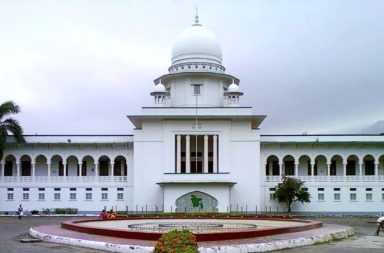Hefajat-E-Islam, a non political religious organization of Bangladesh declared a manifesto of ’13 points demand’ to the government including introduction of Blasphemy Law, and strong punishment against comments (especially blogs) that hurt religious sentiment. After a month long series programs including Long Marches and Public Meetings all over the country, they declared the Blockade of the capital on 5 May, 2013.
As a result, around half million (5, 00,000) activists and general supporters of Hefajat crowded around the Shapla Square of Motihjeel, Dhaka (which is the heart of downtown). At some places, they got involved in violent clashes with Police, Security Forces and other oppositions, but the worst was yet to come.

Role Played by the ‘Human Rights Industry’
British policy magazine Ceasefire has provided a very interesting insight on how the global actors and defenders of Human rights played their role. The excerpt is given below –
“In the business of human rights, there are worthy and unworthy victims. The worthy are deemed by the interests of donors and professional activists in any given situation. In Bangladesh, the performance of the sector and its practices are unaccountable in any meaningful sense, least of all to victims deemed unworthy of attention.
Global players in the sector like Amnesty International and Human Rights Watch as well as the donors that fund their long term monitoring projects rely on local partners for information. Such gatekeepers are human and carry prejudices, competitiveness and consequent limitations. For example, the government’s performers of the year were Sultana Kamal’s Ain o Salish Kendra (ASK), who took a good 10 days to publish a mealy mouthed condemnation of the victims.
The first substantive and official document came from Odhikar, a local competitor to ASK, on 10th June. It was largely ignored until the government failed to wrestle the victims list from them and arrested their secretary during the Eid period in August for ‘fabricating information’. This prompted an immediate US State Department intervention which made no mention of Odhikar’s documentation of the massacre. As indentured students of US diplomacy in these War on Terror times, we are reminded to reflect on the fact that this same department had just recently been training the Dhaka Metropolitan Police on tactical management of special events. With this additional exposure the pro government media quickly waxed lyrical over issues of Odhikar’s ‘faulty methodology’, as the police began leaking information, allegedly seized from the organisation, to the press.
Odhikar has since been nominated for a number of awards by international partners in the human rights industry, but has failed to intervene further and publicly on the issue of this massacre, despite their leadership’s growing international stature. Interestingly, their recent Gwangju Award connects what happened at Motijheel with the Gwangju Massacre of 18th May 1980 in South Korea, in which the western-backed military dictatorship of the time brutally repressed an anti-regime uprising.”



